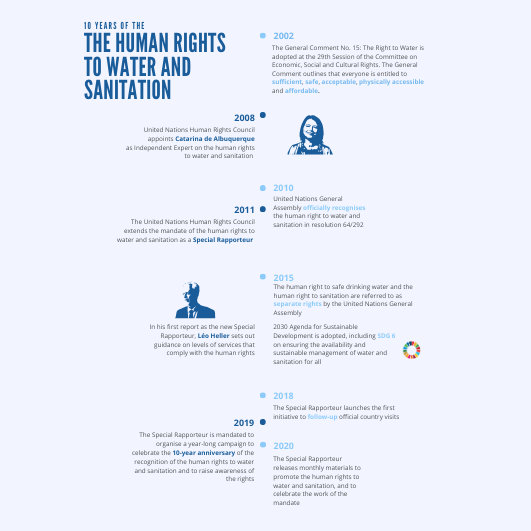About the mandate
Special Rapporteur on the human rights to safe drinking water and sanitation
The mandate of the Special Rapporteur on the human rights to safe drinking water and sanitation was initially established by the UN Human Rights Council in March 2008 as the Independent Expert on the issue of human rights obligations related to access to safe drinking water and sanitation. The Human Rights Council extended the mandate on water and sanitation in March 2011, and changed its title to Special Rapporteur on the human rights to safe drinking water and sanitation.
The Special Rapporteur carries out thematic research, undertakes country missions, collects good practices, and works with development practitioners on the implementation of the rights to water and sanitation.

Timeline of the mandate of Special Rapporteur on the human rights to water and sanitation (English | Français | Español)
History of the rights to water and sanitation at the United Nations
In 2002, the Committee on Economic, Social and Cultural Rights adopted General Comment 15 on the right to water. This General Comment explains that the right to water is considered implicit in Articles 11 and 12 of the International Covenant on Economic, Social and Cultural Rights covering the right to an adequate standard of living, and the right to health respectively.
In 2006, the Sub-Commission on the Promotion and Protection of Human Rights built on the work of the Committee, adopting the Guidelines for the Realization of the Right to Drinking Water and Sanitation. Continuing this momentum, in September 2007, the former High Commissioner for Human Rights presented a study to the Human Rights Council on the scope and content of the relevant human rights obligations related to equitable access to safe drinking water and sanitation under international human rights instruments.
In the study, the former High Commissioner expressed her belief “that it is now time to consider access to safe drinking water and sanitation as a human right, defined as the right to equal and non-discriminatory access to a sufficient amount of safe drinking water for personal and domestic uses - drinking, personal sanitation, washing of clothes, food preparation and personal and household hygiene - to sustain life and health”.
In July 2010, the General Assembly adopted a resolution, which “recognized the right to safe and clean drinking water and sanitation as a human right that is essential for the full enjoyment of life and all human rights” (GA res 64/292). Subsequently, the Human Rights Council, in September 2010, affirmed this recognition and clarified that the right is derived from the right to an adequate standard of living (HRC res 15/9). Taking into account these developments, the Human Rights Council, in March 2011, extended the mandate on water and sanitation, and changed its title to Special Rapporteur on the human rights to safe drinking water and sanitation (HRC res 16/2).
Human Rights Council resolution 7/22 requested the Special Rapporteur (then Independent Expert) to make recommendations that could help the realization of the Millennium Development Goals, in particular of Goal 7. To carry out this task, the former Special Rapporteur consulted with numerous actors working on the MDGs related to water and sanitation and carried out research on that topic. She presented a report to the General Assembly in October 2010 analyzing the MDGs targets on water and sanitation from a human rights perspective, and made recommendations on how these targets could be better aligned with human rights criteria.
Resolutions
|
Year |
Resolution |
Symbol |
| 2021 | GA resolution 76/153 | A/RES/76/153 |
| 2020 | HRC resolution 45/8 | A/HRC/RES/45/8 |
| 2020 | GA resolution 74/128 | A/RES/74/141 |
| 2019 | HRC resolution 42/5 | A/HRC/RES/42/5 |
| 2018 | HRC resolution 39/8 | A/HRC/RES/39/8 |
| 2018 | GA resolution 72/128 | A/RES/72/178 |
| 2016 | HRC resolution 33/10 | A/HRC/RES/33/10 |
| 2016 | GA resolution 70/169 | A/RES/70/169 |
| 2014 | HRC resolution 27/7 | A/HRC/RES/27/7 |
| 2014 | GA resolution 68/157 | A/RES/68/157 |
| 2013 | HRC resolution 24/18 | A/HRC/RES/24/18 |
| 2012 | HRC resolution 21/2 | A/HRC/RES/21/2 |
| 2011 | HRC resolution 18/1 | A/HRC/RES/18/1 |
| 2011 | HRC resolution 16/2 | A/HRC/RES/16/2 |
| 2010 | HRC resolution 15/9 | A/HRC/RES/15/9 |
| 2010 | GA resolution 64/292 | A/RES/64/292 |
| 2009 | HRC resolution 12/8 | A/HRC/RES/12/8 |
| 2008 | HRC resolution 7/22 | E | F | S | R | A | C |
| 2006 | HRC decision 2/104 | E | F | S | R | A | C |